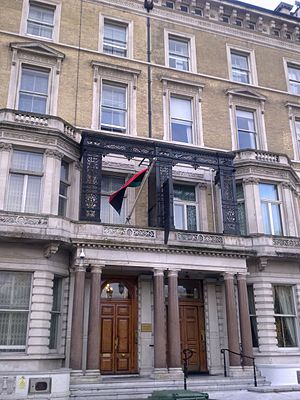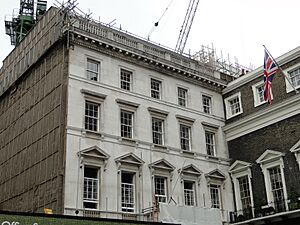Embassy of Libya, London facts for kids
Quick facts for kids Embassy of Libya in London |
|
|---|---|
 |
|
| Location | Knightsbridge, London |
| Address | 15 Knightsbridge, London, SW1X 7LY |
| Coordinates | 51°30′8.4″N 0°9′14.4″W / 51.502333°N 0.154000°W |
| Ambassador | Mahmud Mohammed Nacua |
The Embassy of Libya in London is Libya's official home in the United Kingdom. It's like a special office where representatives from Libya work to keep good relations with the UK. They also help Libyan citizens who are visiting or living in the UK.
Libya has other offices in London too. There's a Consular & Cultural Affairs Section at 61-62 Ennismore Gardens. This office helps with things like passports and visas. It also shares Libyan culture. There's also a Medical Office at 22 Red Lion Street. This office helps Libyan citizens with medical needs.
Contents
History of the Libyan Embassy in London
The Embassy's Earlier Location
The Libyan Embassy used to be in the St James's area of London. This location was often a place where people gathered to protest. These protests were usually against the government of Muammar al-Gaddafi, who was the leader of Libya at the time.
A Time of Change and Relocation
In 1984, a very serious incident happened during one of these protests. This event led to a British police officer being hurt. Because of this, the police surrounded the embassy. The UK and Libya then stopped their diplomatic relations for a while. This meant their official communication stopped.
Diplomatic relations started again in 1999. After this, the embassy moved to its current location in Knightsbridge. This new location is where it is today.
The Embassy During the 2011 Libyan Civil War
The embassy became a focus of attention again in 2011. This was during the Libyan Civil War. People protested against the Gaddafi government. They were upset about how the government treated protesters in Benghazi, Libya.
During these protests, some people even climbed onto the embassy's roof. They took down the old flag and put up the flag of the National Transitional Council. This group was trying to form a new government in Libya. In July 2011, the British government made a big decision. They asked the embassy staff to leave. They then officially recognized the National Transitional Council. This group became the new official authority for Libya in the UK.
Gallery
 | Laphonza Butler |
 | Daisy Bates |
 | Elizabeth Piper Ensley |




